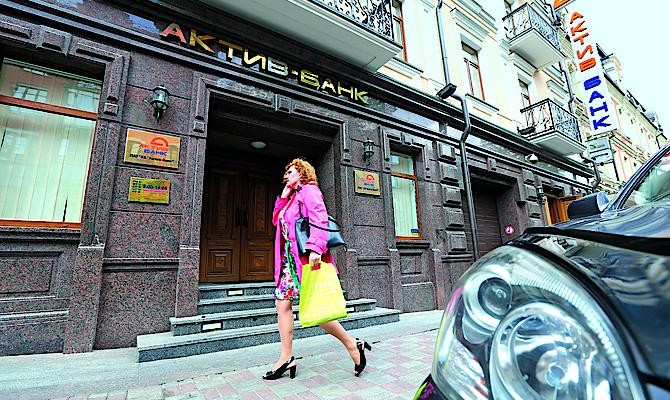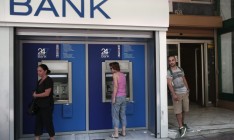Finance
oversightThe Deposit Guarantee Fund will introduce provisional administrations in two more banks

The Deposit Guarantee Fund (DGF) is preparing to introduce provisional administrations in two financial institutions: CityCommerceBank and Aktiv-Bank, according to several sources in the fund. Neither the NBU nor the DGF provided more information on this matter to Capital.
The press service of the fund only confirmed that provisional administrations will be introduced after the resolution of the NBU is released. However, these documents may be released to the DGF even after working hours. In his turn, Director of the Marketing and Advertising Department of Active-Bank Inna Bohush said the bank’s management was not aware of the impending introduction of a provisional administration.
Poor management
According to the NBU as of July 1 CityCommerceBank was in 43rd place with assets of UAH 4.4 bn. The financial institution was established in 2006 and until 2012 was owned by Russian billionaire Vladimir Antonov. Two years ago, the bank found a new owner – the Global Finance Management Group owned by a number of individuals. Antonov earlier argued that the current owners seized his financial institution illegally.
Based on the results of the first 6 months of the year Aktiv-Bank was in 47th place with assets of UAH 3.5 bn. It was established in 2001 by brothers Andriy and Serhiy Klyuev. In 2012 they sold the financial institution to Danylo Volynets and Oksana Markarova, who are quite well known in the investment circles. Yet this spring the bank was supposedly acquired from them by structures associated with Antonov.
Besides the same owner, the banks’ common feature is their insolvency. Experts believe that the main reason for this is the poor quality of assets of financial institutions. Senior Partner at the Kravets & Partners Law Firm Rostyslav Kravets says that when the Klyuyev brothers were the owners of Aktiv-Bank, the financial institution almost never resorted to restructuring of loans. “It is most likely that an inadequate policy of dealing with bad loans led to disastrous results,” suggested the lawyer.
Also, the high concentration of loan portfolios is typical for both banks, says Director of the Financial Rating Department at the IBI-Rating Agency Anna Apostolova. As of July 1 the value of H7 standard (single counterparty exposure limit) in CityCommerceBank reached the maximum allowable amount of 25% of regulatory capital, while the value of the H7 standard at Aktiv-Bank was 34.89%, thus exceeding the NBU level by nearly 10 percentage points. This is also confirmed by the value of the H8 standard (higher credit risk): at CityCommerceBank – 624.45% of regulatory capital, at Aktiv-Bank – 696.29%, with the maximum allowable 800%. “Such a level of concentration carries a high risk of default, which affects the liquidity of the banks,” says Apostolova.
The NBU reported that as of July 1 the credit portfolio of CityCommerceBank totaled UAH 2.44 bn, of which UAH 2.43 bn was loans to legal entities and only UAH 9 mn – debts of the individuals. The loan portfolio of Aktiv-Bank as of the same date was UAH 2.95 bn, of which UAH 1.89 bn were the debts of legal entities and UAH 1.06 bn was the loans to individuals.
Specific problem
The outflow of client funds began at the start of this year on the backdrop of political instability and the decline in the level of business expectations, which had a negative impact on the liquidity of both banks, says Apostolova. Many depositors pointed to the failure of banks to fulfill their obligations. “Four months ago we started receiving complaints about the non-return of deposits of the clients of these banks,” said Kravets. It is also possible to find claims of depositors against the financial institutions in the Unified State Register of Court Rulings.
As of July 1 the deposit portfolio of CityCommerceBank was UAH 2.69 bn, of which UAH 539 mn were the funds of legal entities and UAH 2.15 bn were the funds of individuals. As of the same date, the deposit portfolio of Aktiv-Bank was UAH 2.39 bn, of which UAH 613 mn belonged to enterprises and UAH 1.78 bn were those of individuals.
“Deposit portfolios in these banks were mostly formed by individuals. On the one hand, this improves diversification, but on the other hand it makes the banks more susceptible to negative moods on the market and possible risks of the further outflow of deposits,” says Apostolova. She adds that the terms of investment and borrowing plays an important role – deposits are mainly attracted for shorter periods than loans are issued for enterprises. Due to this, banks have liquidity problems.
Selling for cheap
Experts believe that the most probable way to pull these banks out of the market is either liquidation or sale of some of their assets and liabilities. “Presuming that shareholders have not withdrawn attractive assets and pledges from the banks, I believe the fund will be able to find an investor. In this respect, the DGF had some progress,” said leading financial analyst at the Expert Rating Agency Vitaliy Shapran. But loan portfolios of the two financial institutions require creation of significant amounts of reserves, as they show a high level of concentration, said Apostolova. She believes that in the current environment the probability of finding investors for these banks is very low, as the selling price for these banks will be much lower than their capital.






 of the agreement of syndication with Financial Times Limited are strictly prohibited. Use of materials which refers to France-Presse, Reuters, Interfax-Ukraine, Ukrainian News, UNIAN agencies is strictly prohibited. Materials marked
of the agreement of syndication with Financial Times Limited are strictly prohibited. Use of materials which refers to France-Presse, Reuters, Interfax-Ukraine, Ukrainian News, UNIAN agencies is strictly prohibited. Materials marked  are published as advertisements.
are published as advertisements.